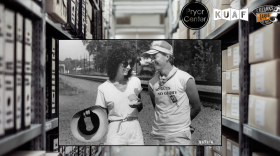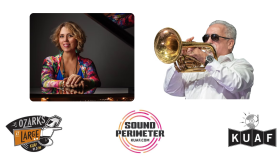The Northwest Arkansas Skateboarding Foundation is a nonprofit dedicated to growing and supporting the skateboarding community. Founder and president Roy Rodezno visited the Bruce and Anne Applegate News Studio One to speak with Ozarks at Large's Jack Travis about the organization and how skateboarding has affected his own personal development.
The following is an edited transcript of that conversation.
Roy Rodezno: That kind of reminded me of how I grew up and thinking about them. And skateboarding has always been a big part of my life. So whenever I'm not skating, I'm just like, trying to work on making myself available to skate more and take care of responsibilities. So that comes with all that trying to make time to skate.
Jack Travis: So you kind of live to skate?
Rodezno: Hmm, yeah. I actually have "Skate for Life" tattooed right here on my arm. I got that in 2010. And that kind of phrase has been a staple with me and my friends. We grew up skating. We were like, "Skate for life. Always keep skating." We didn't think about anything else. We weren't out partying or anything like that. We're just like, we want to skate. So we're always hitting the streets and trying to go to as many skate parks as we could. But I grew up in Rogers. So, there wasn't a skatepark till I was three years into skating. Then, the skate park came about. So then that'd be the meeting place for everybody.
That's how NWA skateboarding started. I saw, like you said, biking; everybody was getting all that attention. And I think skateboarding- It's a big community that's underground. Everybody knows a skater, or you skate, and a majority of people used to skate when they were little. So, the idea is to promote that and make it more mainstream and more family-oriented. Because nowadays, all of us that were skating when we were 13. Now we're all 35. We have kids, and they're skating into now. Not just mine, but everybody else's kids who I grew up skating with.
Travis: So, what drew you to skateboarding originally? Like little 13-year-old Roy, what brought it about in your life?
Rodezno: So I was always active. I was always biking and playing football in the neighborhood, baseball, basketball. And I saw my friends messing with a skateboard. And I was like, 'Huh?' because I hadn't had a skateboard, and I was like, six years old when everybody has a skateboard to play on, but I never gave anything serious about anything like that. And then one of my friends was trying to do a kickflip. He was like, 'Stay on a board and try that.' So then, I tried to do that. He was telling me how to do one. Then I started trying. And then all of us kind of just like had boards in the garage. They had boards in the garage. They were able to put me together a board. Then they had their boards, and we just started skateboarding in the neighborhood. And around then, we're 13-year-old teenagers. So that kind of just helped us become a team. Because I had a lot of energy and for me, that was a good medium to transfer that energy to skate. I was super focused on that.
Travis: So you mentioned that the local scene is currently kind of underground. Could you tell me a little bit more about that?
Rodezno: Yeah. So since 2019, that's when we came about as 2018 sort of organizing the foundation, the nonprofit because I saw the bikers and everybody, they're getting all the attention and growing of their community. But I saw they all had a nonprofit that has somebody to voice what they want and and somewhere for the community leaders and city leaders to go into to connect with those groups and find out what these groups want. So that's where that's where we come about. It is to be able to raise our voices in a more professional way. So we're not kind of discounted, like, 'Oh, they're just skaters who don't know what they're talking about.' I'm using my skills as a graphic designer and web designer to visually communicate that message of what skateboarding is. That's the main thing with that is being able to, let's say, in Bentonville, there was a public input meeting for a big park that they were going to build. So I was like, alright, "I'm gonna show up." And with the proposal, I'd already been putting together proposals to advocate for skatepark. So that's the main thing that I saw that was missing was an update to skate parks- all of our skate parks are like 20 years old or more. And so, I thought it needed to be our goal to try to get a skate park that is a more modern skatepark. So that became the ultimate goal.
Travis: Do you mind if I ask which park that's going to be at?
Rodezno: It'll be called the Wheelsports Garden. That's what we pitched in the proposal that the idea of these new skate parks is to be more open and have more green space in between where families can picnic and relax and watch everybody skate. Because it's a big spectator sport for everybody who loves to watch skateboarding because it's amazing. It's really hard to get good at, but once you see good skaters, it's amazing because they're defying physics.
Travis: I mean, people love to watch it. It's in the Olympics now.
Rodezno: Yeah, exactly. So that also can help us get that attention too. It's not just us saying what we think we should get or need, but it's also backed up by mainstream media, and also the Olympics and all the other major brands in skateboarding.
So, a way of growing skateboarding is to advocate for the community in a professional way. Saying, 'Hey, we're here for skateboarding. If you need anything, you know, we don't sell anything or anything like that.' We're not going to the city of saying like, 'We will build the park. Give us the money.' We're just saying the idea, and then you guys contact the builders and all that.
Travis: Okay. The ultimate goal of your organization, NWA Skateboarding, is to expand skateboarding in Northwest Arkansas. But why do that? How can skateboarding help people? How has it helped you? How will NWA skateboarding function to help skaters?
Rodezno: So, why is because the impact of skateboarding, and that's something that we want to bring into light, is the impact of skateboarding is not talked about enough because it's a really high valuable impact for me as a skater, that taught me so many skills that I've never been able to learn anywhere else. That's the impact. My current job is as a freelance web designer. So I'm self-disciplined and self-motivated. I'm a problem solver, and all that is because of skateboarding. I got that mentality because of skateboarding. Because, really, you push yourself. You have your friends, but, ultimately, it's up to you, your mind, and your physical body to sync together to get that trick. Nobody's going to teach you exactly how to do that. They'll give you tips and tricks. But ultimately, it's you making that connection.
That dedication, what it takes to get good is you have to keep trying over and over. You have to push yourself. You feel the reward. When you finally get that trick that you've been trying for months, hours every day, that feeling is so amazing. That keeps you wanting to keep doing it. You want to keep feeling that amazing feeling. It's like a relief- like you feel stress relief. You feel accomplished. You feel motivated, like 'Okay, if I could do this, then I can do it. If I could do that, then I can go to the higher trick.' And then eventually you're really good. But that mentality impacts you forever. And other fields have that same mentality. Whenever I started freelance web designing and learning that same mentality, 'Well, I'm not gonna give up until I get it, until I get clients, until I bring them results.' And also whenever I became a dad to twins, that was working from home, I took care of them too at the same time. So I was working around the clock, and their mom would be able to work, so I'd be with them all day for about eight or nine hours at a time.
So, it's that same mentality, that skate mentality in my mind right there. I'm gonna figure out their communication when they're infants, and then as they get older, you face the challenges of parenting, but that skate mentality just like, 'Well, you know, I have a kid, I'm gonna achieve this. I'm gonna learn this.' And then we go to the higher level with that same mentality, and you're succeeding in all those different aspects. Any other like high intensity sport like that will also teach you that. But everybody knows about basketball, baseball, softball and all that, and it's all you know, in the schools and stuff. But skateboarding isn't. But skateboarding has such an impact. And the community that's for you as a person, but the community impact is about bringing people together. So I know people. I'm 35 now, so I've been skating for like 22 years now. And people that I've met back then, they're still my friends because of skateboarding. Just like that, skateboarding is that glue that you just click. Once you're there, it doesn't matter who you are or where you come from. Or anything like that. It's just- you're a skater, and that's all that matters. And we all know, like, the struggle that you put into skateboarding, and so when you see tricks landing, everybody cheers. It's like, you know in basketball games, when somebody gets a point? Everybody cheers because they know how hard it is. But they don't know how hard it is in skateboarding. You don't really know how hard it is, unless you're in it.
So, that's where why we're bringing the community together now. You see a lot of people, they'll just go to the skate park just to watch. It's a big spectator sport. So skateboarding can be the same glue for the community that it is for skaters by being able to bring families together. Now it's not weird that a dad is skateboarding, a mom is roller skating, and then you see a daughter on a scooter or their son on a skateboard, or vice versa. You know, back when I was 13, it'd be weird like you just thought 35-year-old skater like, 'Grow up.' People used to say that, but for us it's like, 'I don't care.' I got "Skate for Life" tattooed right here because I'm gonna do it until I can't.
Ozarks at Large transcripts are created on a rush deadline by reporters. This text may not be in its final form and may be updated or revised in the future. Accuracy and availability may vary. The authoritative record of KUAF programming is the audio record.








